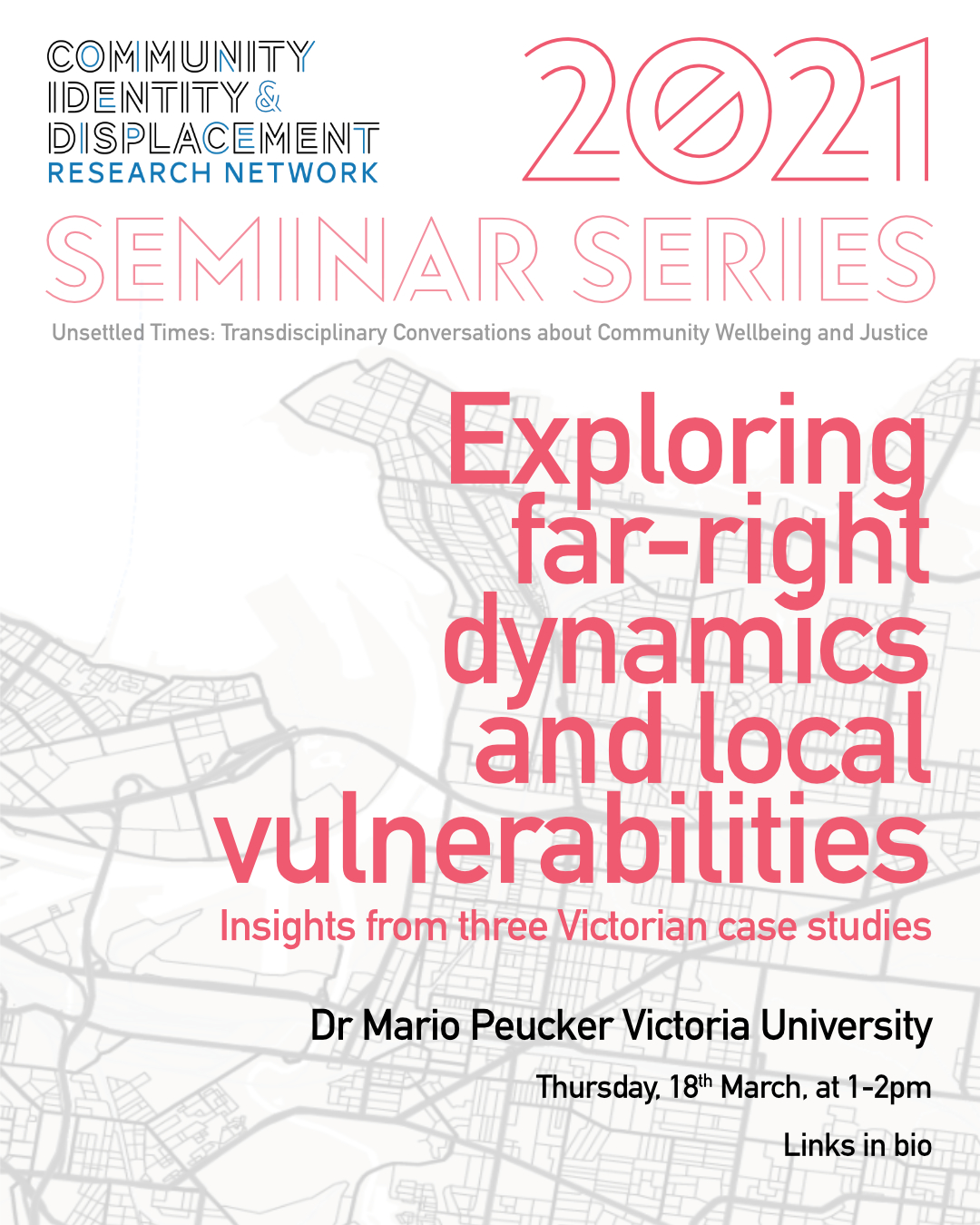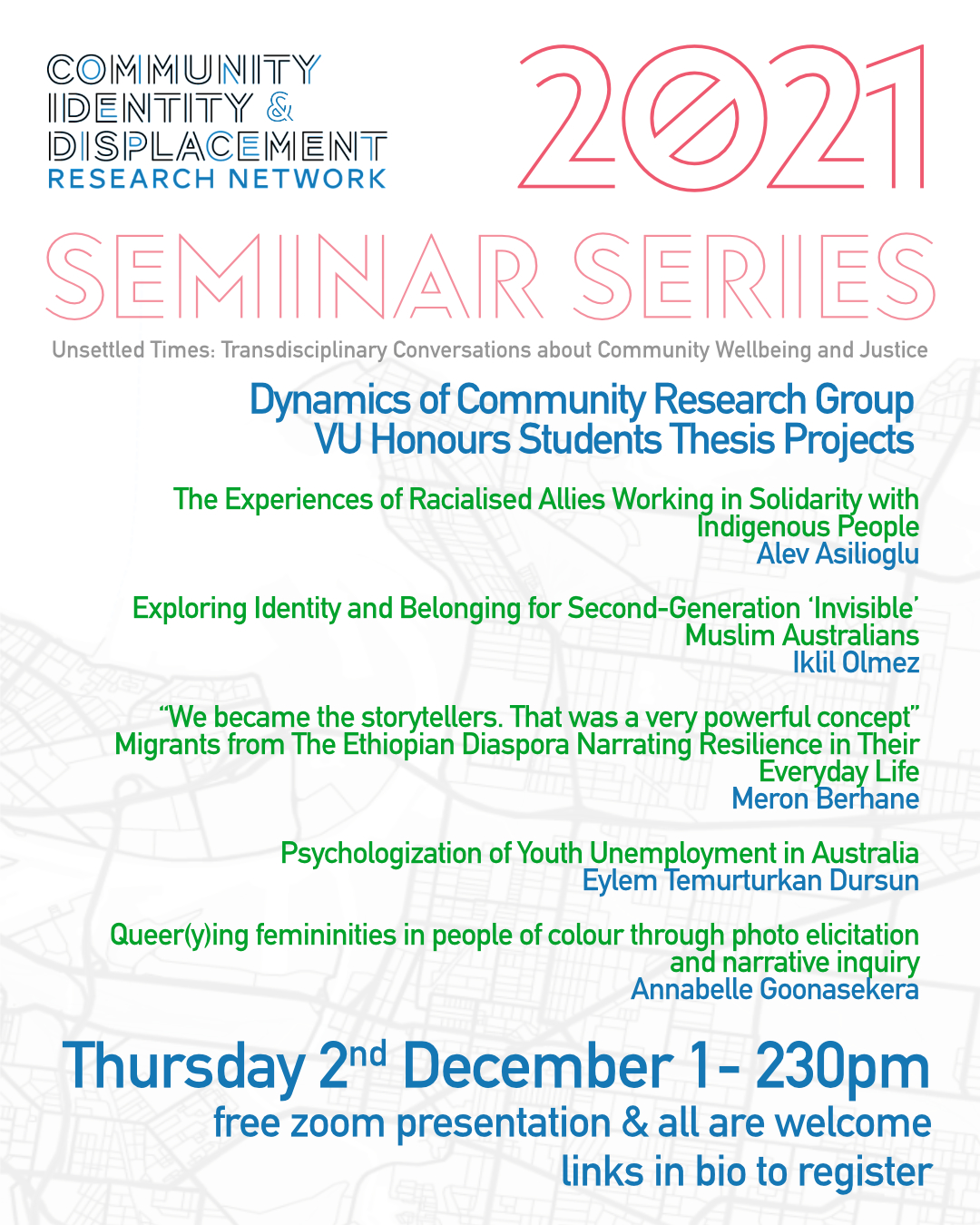
DECEMBER SEMINAR
The Dynamics of Community (DoC) research collaborative supports research and writing that considers the ways in which people and communities’ function, with a particular focus on the context (e.g. social, political, cultural, organisational) in which people and communities exist. The collaborative seeks to understand power relations that shape individual and group identities, intergroup relations and subjectivities. DoC is interested in qualitative and creative approaches to elevating the voices of individuals and groups displaced because of change processes or marginalised and excluded because of forms of material practices and symbolic violence such as racism, classism, and sexism. By developing insights from these vantage points we are better placed to understand how people survive, resist, and provide new avenues for creating inclusive and receptive social environments.
This seminar will present an overview of minor thesis projects completed in 2021 through the Dynamics of Community research collaborative. These projects engage a range of qualitative methodologies such as narrative, discourse and photo elicitation approaches to examine identity-making, belonging, the formation of inter-cultural solidarities, community-making and a troubling of taken for granted categories and constructs – within the Australian context:
The Experiences of Racialised Allies Working in Solidarity with Indigenous People – Alev Asilioglu
Psychologization of Youth Unemployment in Australia – Eylem Dursun
Queer(y)ing femininities in people of colour through photo elicitation and narrative inquiry – Annabelle Goonasekera
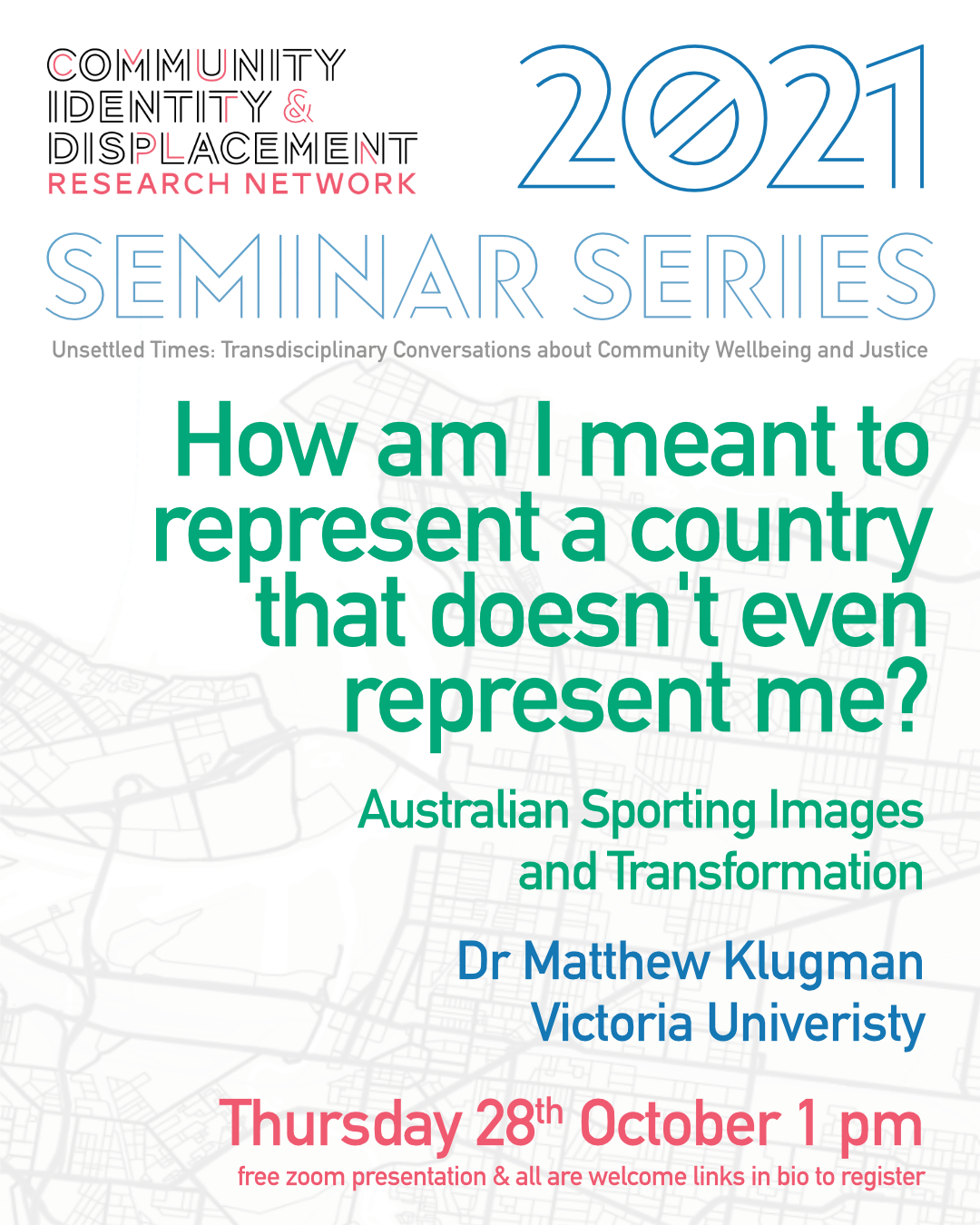
OCTOBER SEMINAR
How am I meant to represent a country that doesn’t even represent me?’: Australian Sporting Images and Transformation?
Matthew Klugman
Abstract:
This paper takes Liz Cambage’s recent calling out of the Jockey Australian Olympic team advertising campaign, as a starting point for a discussion of the visual representations of Australian sport and the issues of racism and sexism that intertwined in this. What, I want to ask, might be gained from studying the history of such images, and how might critical engagements with art and notions of decoloniality inform this process? At issue are questions of the power of Australian sport, the structural racism and misogyny that still shape it, and visual illiteracy in Australia.
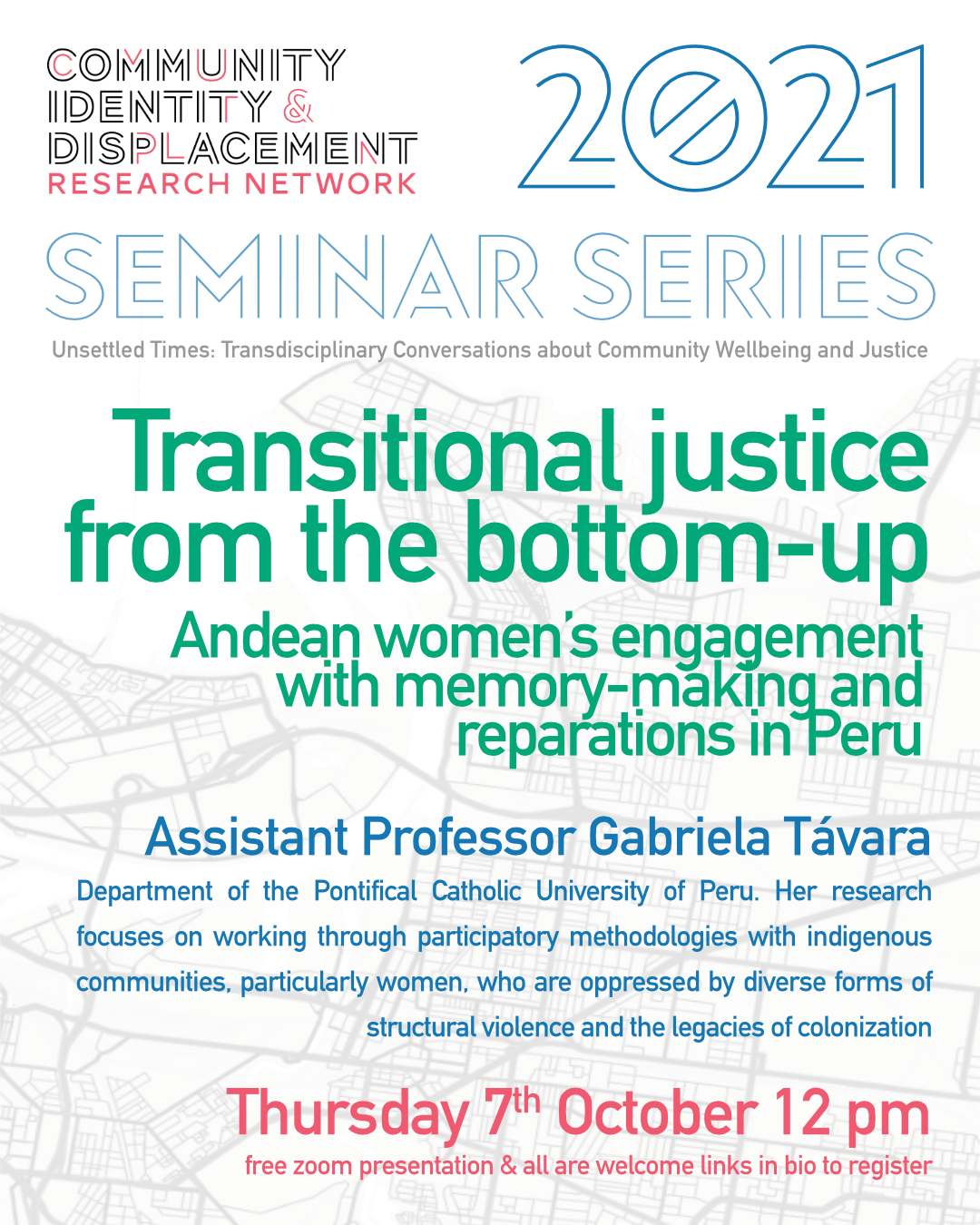
SEPTEMBER SEMINARS
Transitional justice from the bottom-up: Andean women’s engagement with memory-making and reparations in Peru
Gabriela Távara
Gabriela Távara is a community psychologist and Assistant Professor at the Psychology Department of the Pontifical Catholic University of Peru. Her research focuses on working through participatory methodologies with indigenous communities, particularly women, who are oppressed by diverse forms of structural violence and the legacies of colonization.
Through this talk I explore how a group of Andean women from a town deeply affected by the Peruvian armed conflict experience, and engage with, memory-making processes and reparation programs implemented in their community. I focus on how structural inequalities, that have shaped the landscape of the Peruvian society, are reproduced by these transitional justice mechanisms and how Andean women seek ways to challenge them.
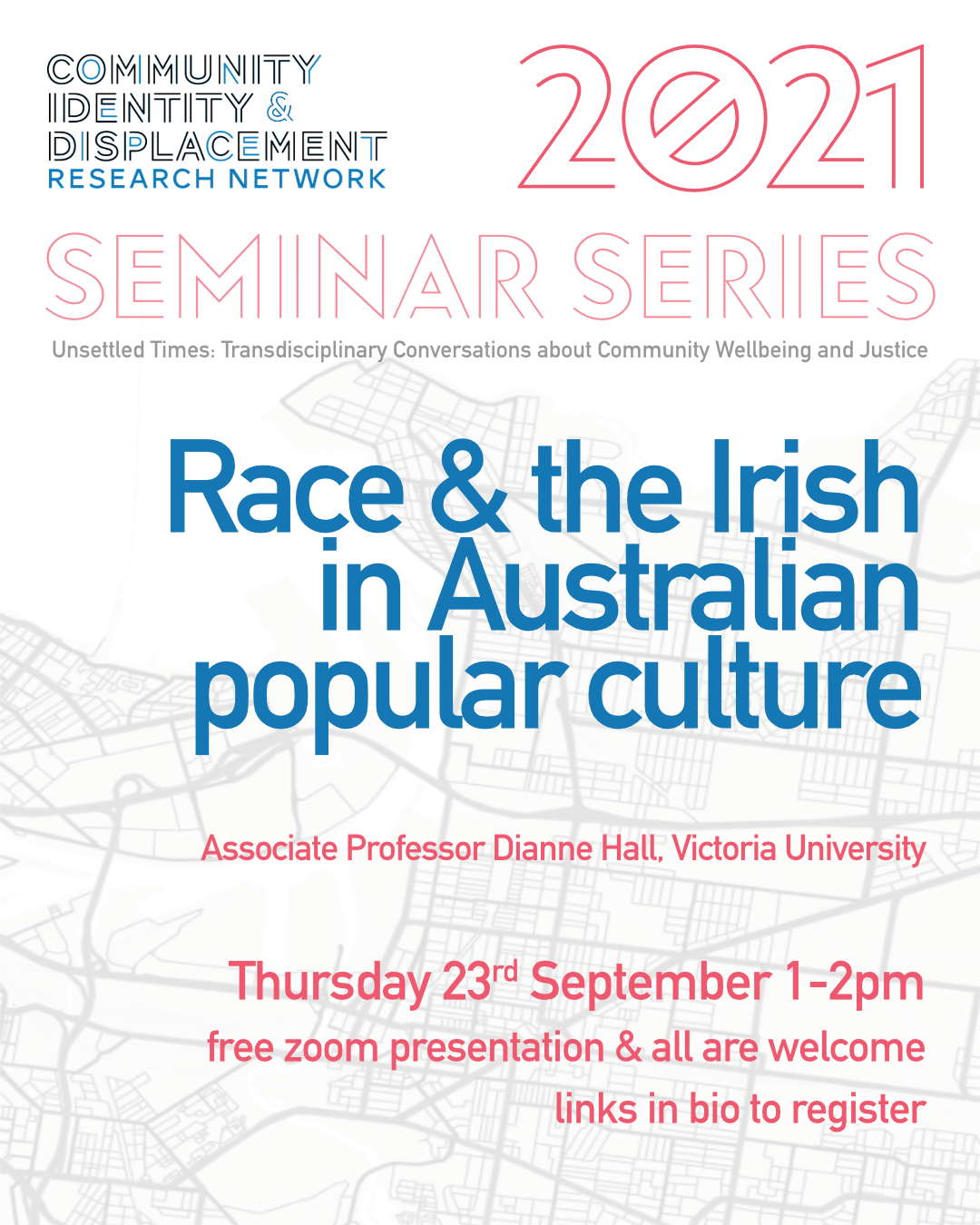
Race and The Irish in Australian Popular Culture
Assoicate Professor Dianne Hall
While today many Australians of Irish descent pride themselves on the fact that their ancestors were less culpable in the racist policies and practices of colonisation in Australia, the reality is more complex as Michael D. Higgins, President of Ireland, recognised this is one of his first speeches on an official tour of Australia in 2017. This paper analyses one element of that complexity by examining how Irish Australians were represented in popular media and culture when in the same frame as two racialized groups, First Nations people and Chinese Australians.
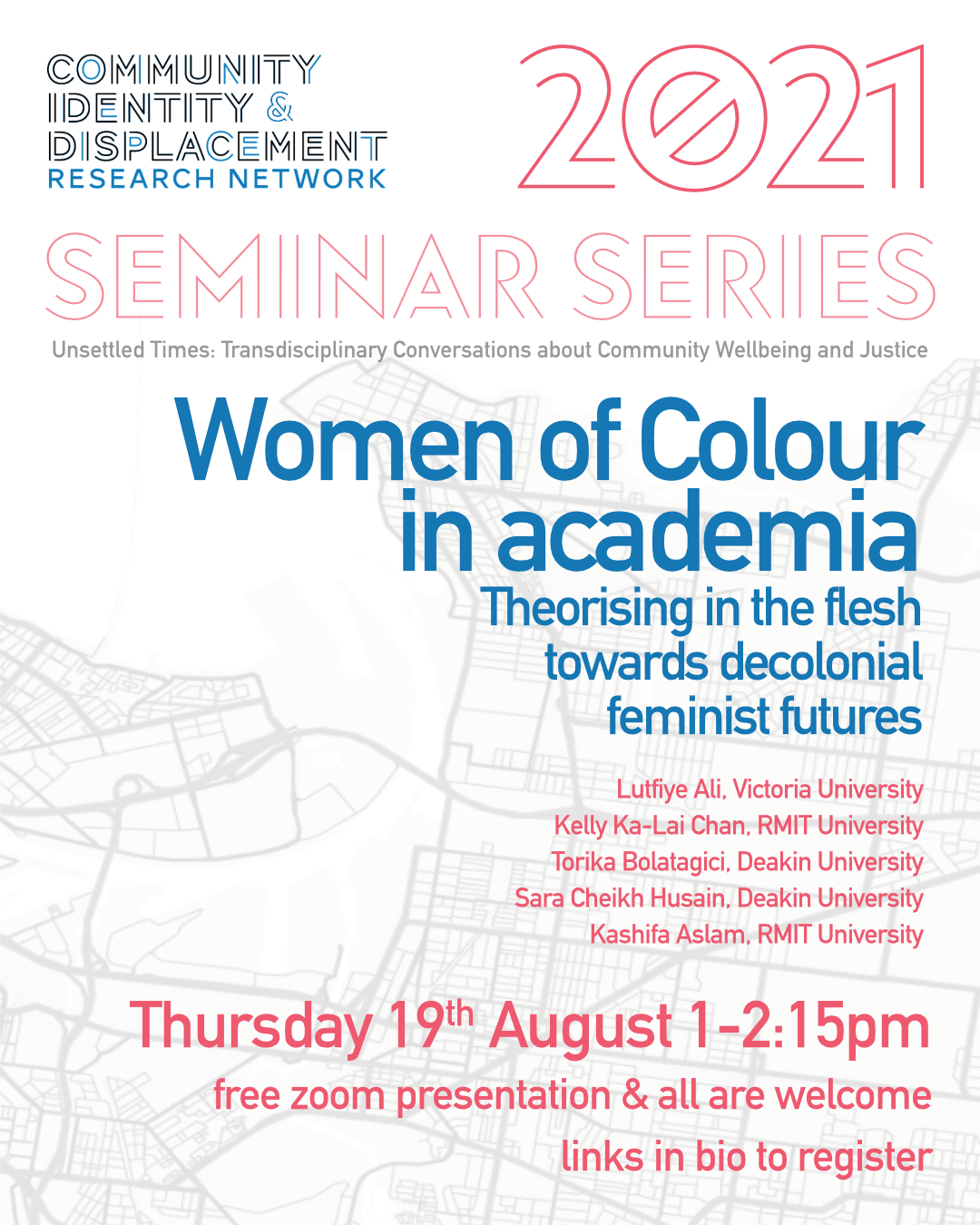
AUGUST SEMINARS
Women of Colour in academia: Theorising in the flesh towards decolonial feminist futures
Lutfiye Ali, Victoria University, Kelly Ka-Lai Chan, RMIT University, Torika Bolatagici, Deakin University, Sara Cheikh Husain, Deakin University, Kashifa Aslam, RMIT University
For many ‘women of colour’ (WoC) scholars research is not just an academic endeavour but also a creative and political project that is lived through experience and a critical part of our personal and collective history. This form of embodied research/creativity, challenging Eurocentric epistemological assumptions of ‘disembodied knowledge’, is based on third world feminist theories which recognise that knowledges are informed by social locations and material, discursive, and political conditions. As WoC, this way of thinking about identity and knowledge inspires us to ‘theorise from the flesh’ about our experiences of being WoC in the academy. Our narratives reveal how heteropatriarchy and racism is re-produced and enacted and the ways our labour and knowledge are tokenised, appropriated, co-opted and silenced in academia. Our stories show how we engage in transformative resistance in and through our research and ways we navigate academia by fostering solidarities of resistance, belonging and social change.
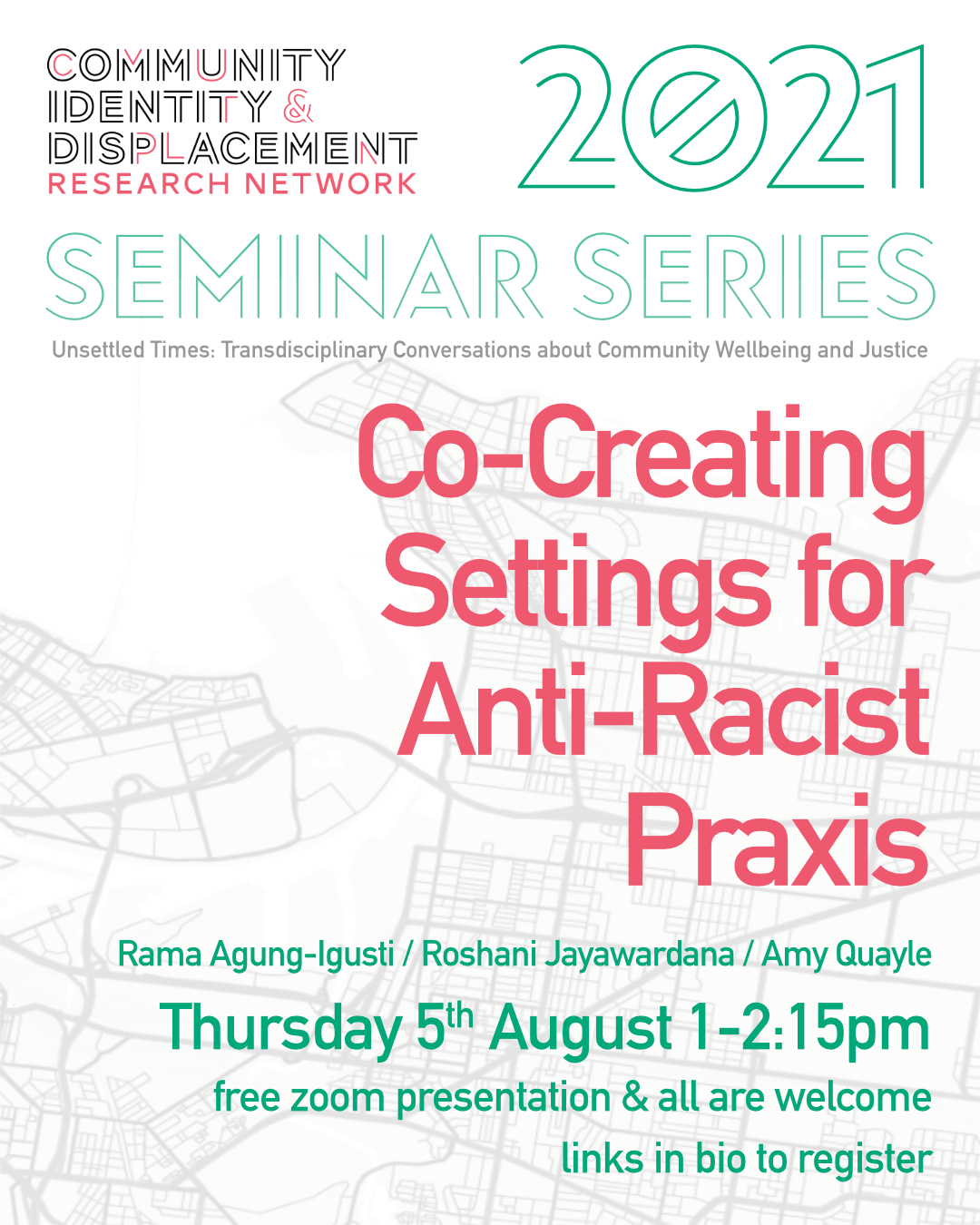
Co-creating setting for anti-racist praxis
This seminar will share research and praxis that seeks to address matters of racialisation and racism and white supremacy in community, organisational and everyday settings. Rooted in the values of justice and diversity and aspirations of liberation and critical community research and practice, the research shows that it is vital to expand our ecology of knowledge and praxis through the creation of settings and narratives from the margins in order achieve epistemic inclusion and racial justice. The papers in the session offer examples of community engaged research that seek to promote racial justice and communality. The projects highlight the importance of relational ethics in research and practice, the role of critical witnessing in praxis, and the central function of critical dialogue. The papers will include:
“We’re creating a sense of home”: Alternative settings as enactments of self-determination and racial justice – Rama Agung-Igusti, PhD candidate, Institute for Health and Sport, Victoria University, Melbourne, Australia
Liberating methods: Mobilising community radio for community place and narrative making - Roshani Jayawardana, PhD candidate, Institute for Health and Sport, Victoria University, Melbourne, Australia
Awakening to Injustice: Documenting Reflexive Anti-Racism Journeys in Post-Colonising Australia – Dr Amy Quayle, PhD, Victoria University, Institute for Health and Sport, Victoria University, Melbourne, Australia
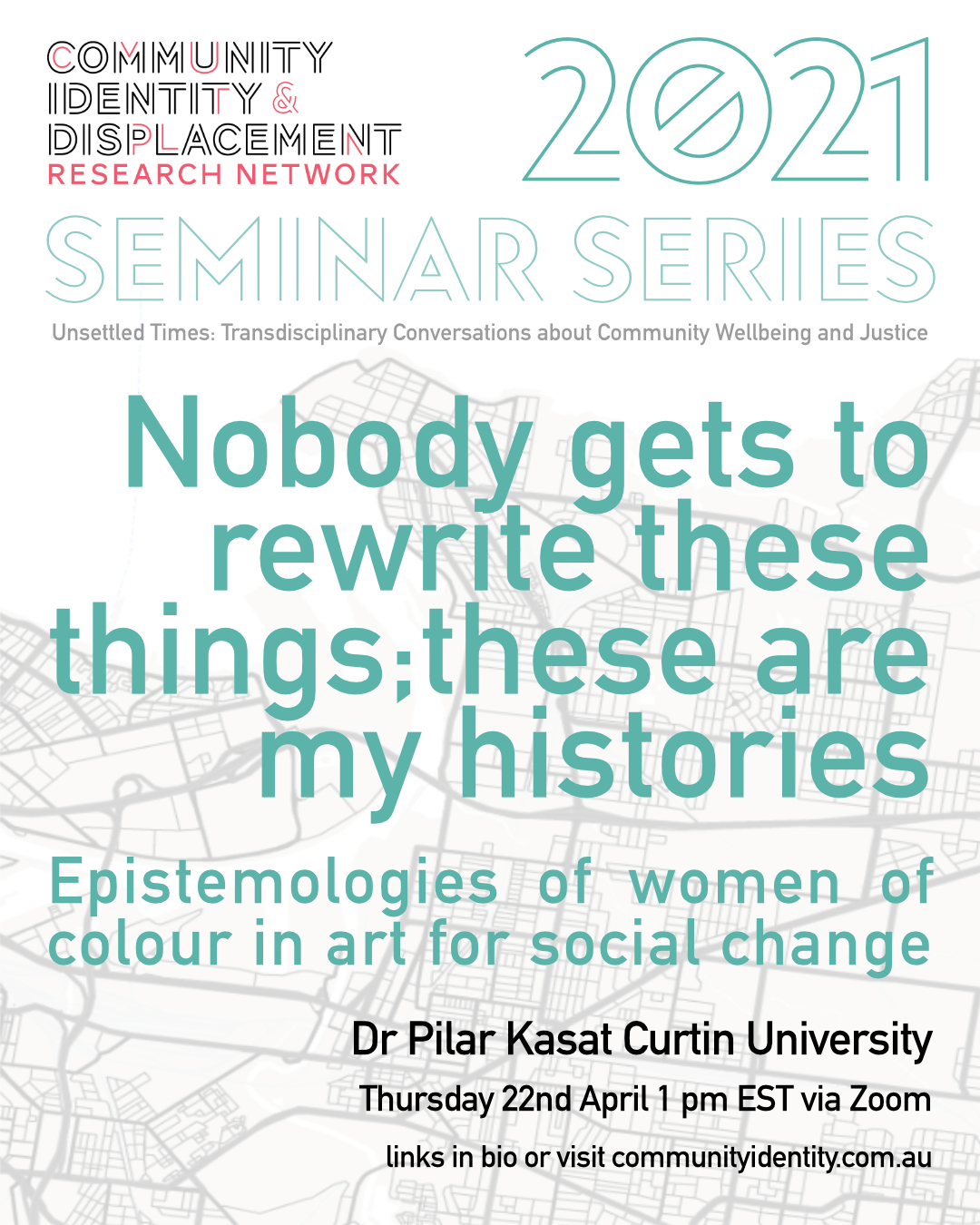
APRIL SEMINARS
Art for Social Change (ASC) is a community-based creative practice associated with social justice and the empowerment of communities. Inspired by thinkers from the Global South, these emancipatory practices have become broadly accepted, seen as contributing to community participation, and as a way of engaging with minoritised communities. This paper focuses on the processes of ASC in the context of a colonial settler society and women of colour. From a feminist perspective from the Global South and using case studies across different geographies that centre of women of colour, this paper examines how ASC unfolds at the intersection of complex racial relations, where art making and story-telling shape unique possibilities for personal and community connection.
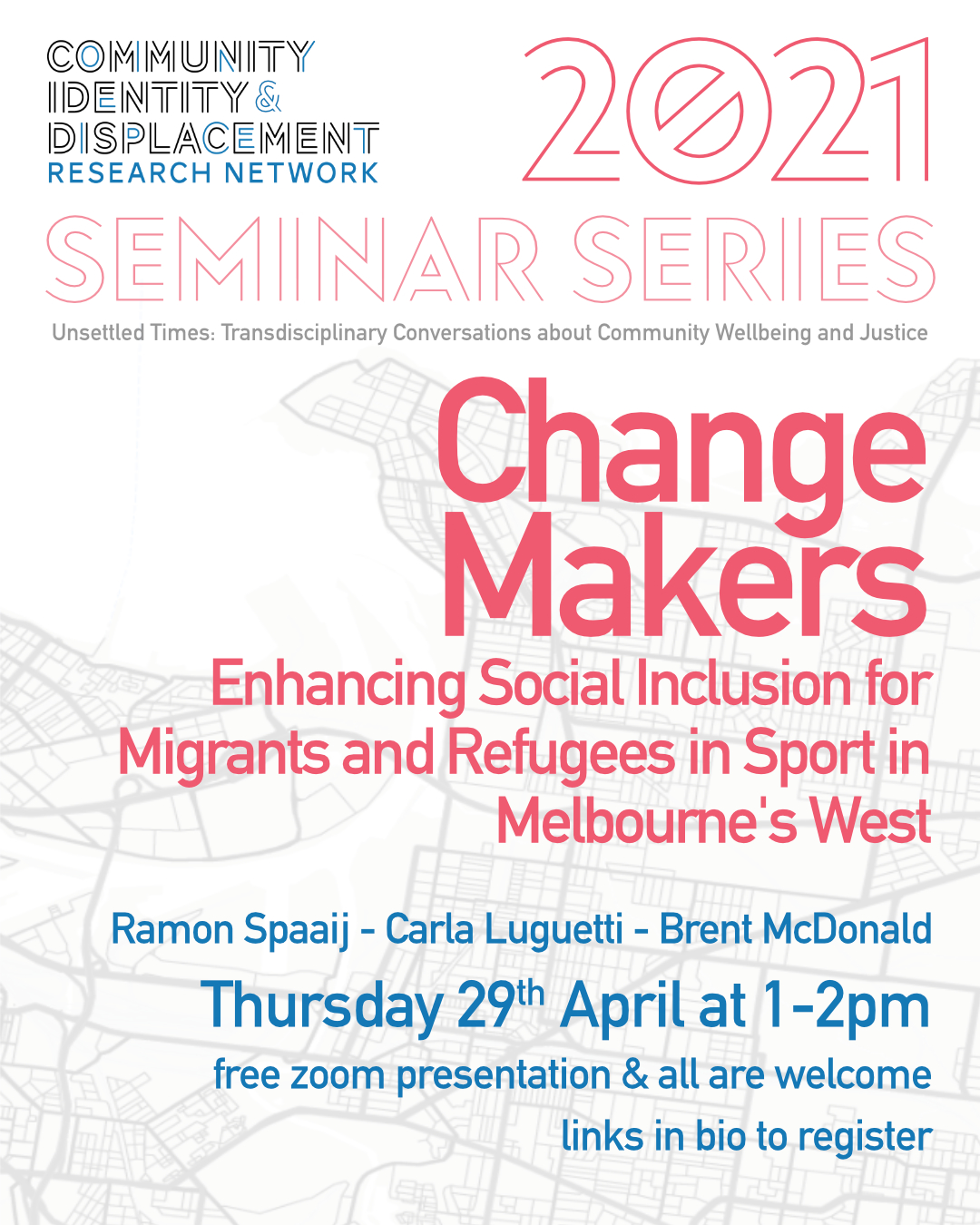
Change Makers is a collaborative program led by Victoria University’s Sport and Social Change Living Lab in partnership with community organisations and local government. The program aims to drive systemic change toward transformative social inclusion of migrants and refugees in sport and physical activity in Melbourne’s West. The project creates a community of practice of 60 Change Makers from a range of sports and community groups who are trained, mentored and supported to design and implement innovative projects that address structural and cultural barriers to participation. Beyond participation, Change Makers seeks to enhance the representation of migrants and refugees in positions of leadership in local sports clubs. In this seminar, we explain the rationale for the program, the theory of change that underpins it, and the community engagement and co-creation mechanisms adopted in the program.
MARCH SEMINAR
In 2019 and 2020 a research team at Victoria University examined, in partnership with several local councils, far-right dynamics in three local municipalities across Victoria. A particular focus of the study was to examined local factors that may make some people more or less vulnerable to far-right mobilisation. How did far-right groups use local concerns and grievances for their own radical agenda and how did local stakeholders, in particular community and civil society groups and local government respond? Based on extensive empirical fieldwork, the study explored, among others, how structural factors, such as urban planning and segregation, interact with identity-related issues, such as local pride and belonging, and in doing so either fuelling social division and polarisation or advancing a progressive agenda of inclusion and social justice.
Watch the recording of Mario’s presentation below

